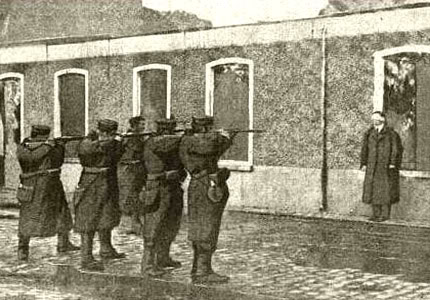Submitted by Megha Desai on
 After Utah death-row inmate Ronnie Lee Gardner selected the firing squad as his method of execution, the Salt Lake Tribune responded by highlighting how this event may impact Utah's tourism. Given the highly contentious nature of use a firing squad in the first place, one would expect coverage of this news to focus more on the barbaric nature of this practice.
After Utah death-row inmate Ronnie Lee Gardner selected the firing squad as his method of execution, the Salt Lake Tribune responded by highlighting how this event may impact Utah's tourism. Given the highly contentious nature of use a firing squad in the first place, one would expect coverage of this news to focus more on the barbaric nature of this practice.
The Tribune article, titled "Tourists likely won't skip Utah because of firing squad," reports that ultimately the Utah tourism industry is not worried about the negative effect of this execution:
"To Salt Lake Convention & Visitors Bureau spokesman Shawn Stinson, Gardner's execution will be a complete 'non-issue' for people deciding where to stage their group's upcoming meetings. Maybe we'll get more attention because [a firing squad execution] doesn't happen that often," he said, "but I don't see it as having an impact on tourism or convention sales whatsoever."
Maybe the Salt Lake Tribune and the people of Utah are missing the point. Currently, 49 states ban execution via firing squad, including Utah. However, Utah passed the ban against firing squads in 2004, and Gardner is one of about 10 individuals who were sentenced to death prior to the ban, so he has the option of selecting the firing squad method. Oklahoma is the only state in the U.S. that still allows execution by firing squad. While the death penalty thrives in many U.S .states, especially Texas, all western European countries and Canada are death penalty-free.
Proper Procedure, Fair Review
A big concern with death penalty cases is the lack of proper procedure and fair review. Consider the case of Charles Dean Hood, who is currently sitting on death-row in Texas. Although it was apparent to Hood's attorneys that the trial judge and the lead prosecutor in Hood's case were involved in a long-seated affair, both parties Hood Case denied the accusations. In 2008, the affair was finally uncovered with actual evidence, and Hood's attorneys appealed his case to the Texas Court of Criminal Appeals on the grounds of judicial bias and conflict of interest. The Court of Criminal Appeals denied the appeal on the grounds that Hood's attorneys should not have waited so long to bring the appeal.
This is simply bogus. Hood's attorneys couldn't prove the affair until 2008, when it became public, so any appeal before this time would have been dismissed as unsupported. Hood's case illustrates the need for fair and unbiased procedure, specifically in death penalty cases. Procedure is only the beginning of the problems with death penalty in this country. Since 1970, Illinois exonerated over 200 innocent men from death row. This begs the question: Are innocent men and women being put to death because of a faulty system?
David Dow, a Texas death penalty lawyer, describes the procedural problem succinctly: "Jurors duck behind other jurors. Judges take refuge behind jury verdicts. The appeals courts wordlessly affirm the trial judge. Then the Supreme Court hangs out a sign that says GONE FISHIN'."

Comments
Leisureguy replied on Permalink
While I share your distaste
waterflaws in Denver replied on Permalink
Statistics regarding firing-squads.
KevinD replied on Permalink
Death Penalty
Lisa Graves replied on Permalink
innocence?
Anonymous replied on Permalink
firing squads
Mutternich replied on Permalink
Just keep your hand on your wallet...